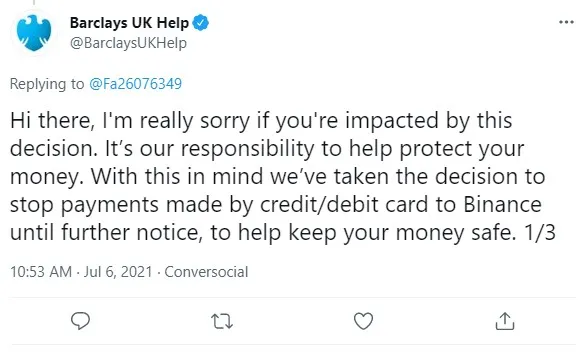|
Getting your Trinity Audio player ready...
|
Barclays bank has suspended all debit and credit card transactions going to Binance, the company has announced. The drastic move comes as a result of the U.K.’s financial regulator, the Financial Conduct Authority, issuing a notice that Binance is not permitted to operate in the country.
The British bank notified customers who had made payments to Binance of the move via SMS, according to Business Insider. The message explained to customers that the move was done to “keep your money safe.” The bank has been explaining the situation to aggravated Twitter users ever since:

The offering of securities and derivative products based on digital assets is prohibited in the U.K. without FCA authorization, which Binance doesn’t have. And yet, as offshore digital asset exchanges as they typically do, Binance offers its services to customers regardless of whether they are legally permitted to do so. The FCA are far from the first to pick up on this: in 2021 alone, investigations into Binance have been launched by the U.S. Commodity Futures Trading Commission (CFTC), Internal Revenue Service (IRS) and Department of Justice (DoJ) for, among other things, serving customers in U.S. without the necessary licenses.
The FCA’s statements can’t be a surprise to Binance: documents leaked by Reuters in 2020 show a proposed internal strategy for undermining the jurisdiction of U.S. regulators, so the company is fully aware of the laws they should be following. It also won’t be a surprise to those who have been paying attention to the regulatory sea-change currently taking place within the industry: regulators are coming down hard on non-compliant companies and their personnel, and Binance has already been identified as the single-largest destination for criminal funds, so to see regulatory action ramp up around the world is an obvious step. It will be a surprise to the many people who have been taken in by promises that the digital asset industry can operate outside the scope of the law, however.
For those people, this is a fantastic illustration of how it is the law which reigns supreme, rather than the many schemes that companies like Binance put in place to avoid it.
Operating in contravention of the legal system isn’t just about the risk of being sued, criminally charged or both—though, as is increasingly being demonstrated, those are the inevitable consequences of non-compliance—and not just for the executives at the top. Law enforcement has shown themselves to be willing to go after the employees carrying out illegal activity on behalf of their employer, and thanks to the U.S. RICO (Racketeer Influenced and Corrupt Organizations) Act, they have the tools to do so: individuals who are using their company for racketeering activities, which includes the facilitation of money laundering, can be prosecuted under RICO and can face up to 20 years in prison for each count of racketeering.
It’s also not just a case of relocating to the least-developed jurisdiction. It’s that honest companies—like Barclays—will not engage with a non-compliant company. As more and more regulators and law enforcement agencies around the world begin to hold companies like Binance to account, the amount of legitimate entities willing to do business with them shrinks, until the only companies willing to do business with them are the ones who are just as non-compliant.
Regulators around the world appear to be positioning for a big swing at Binance: the real question is which regulators will strike first, who they’ll target, and how long those involved spend in jail.
Follow CoinGeek’s Crypto Crime Cartel series, which delves into the stream of groups—from BitMEX to Binance, Bitcoin.com, Blockstream, ShapeShift, Coinbase, Ripple and
Ethereum—who have co-opted the digital asset revolution and turned the industry into a minefield for naïve (and even experienced) players in the market.

 03-29-2025
03-29-2025 





